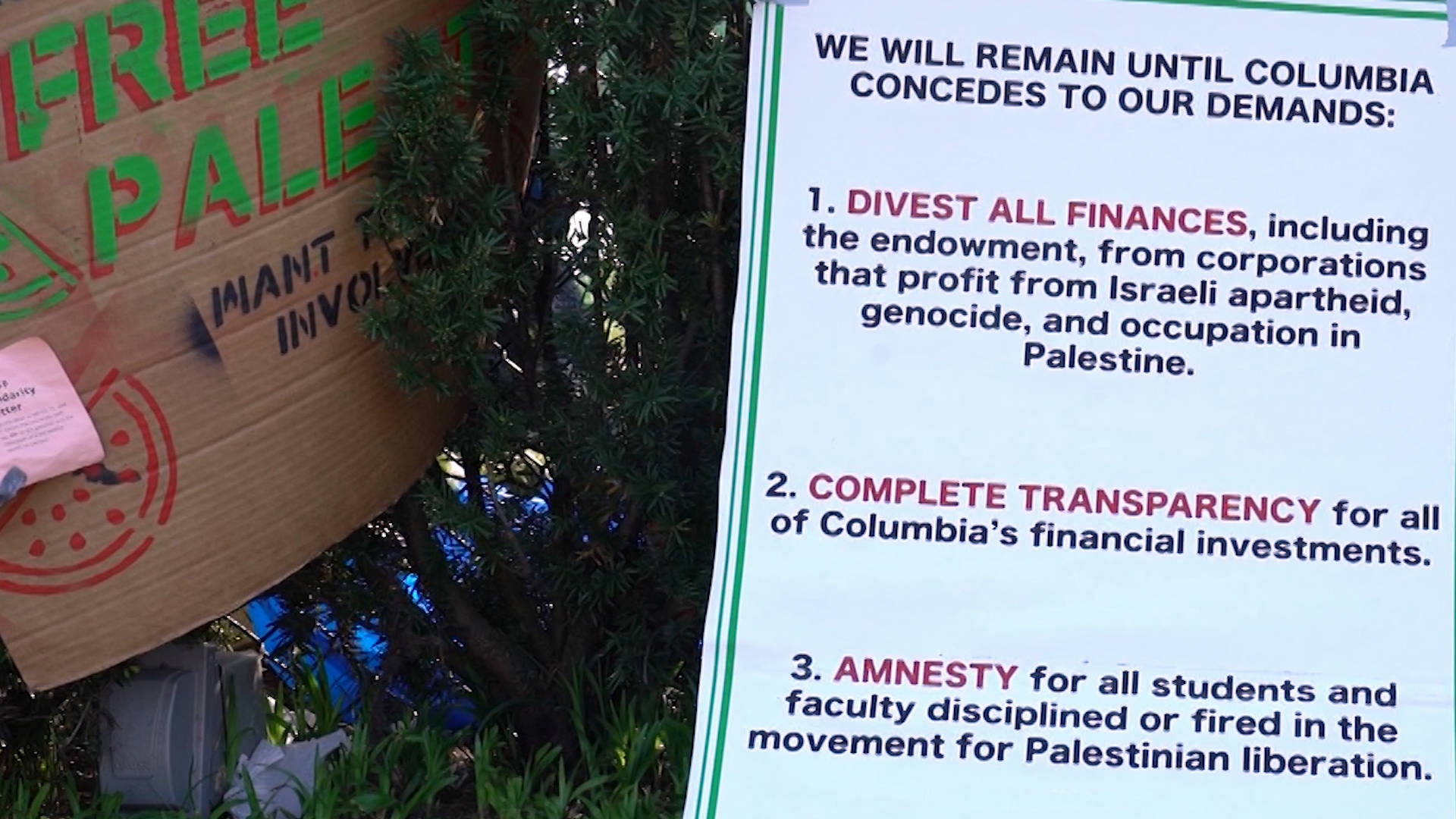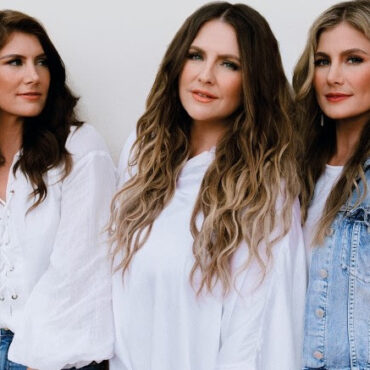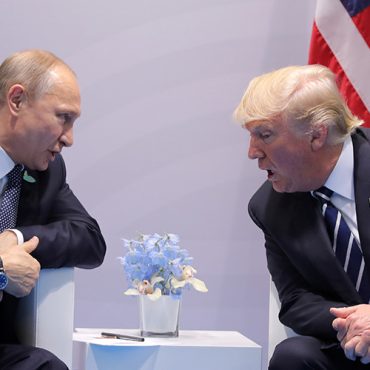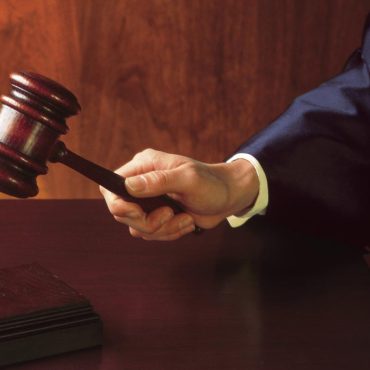This is a rush transcript. Copy may not be in its final form.
AMY GOODMAN: As police crack down on student protesters around the country, we begin today at Columbia University, where scores of students took over Hamilton Hall just after midnight last night after the school began suspending students who refused to leave the Gaza Solidarity Encampment, which began almost two weeks ago. Columbia’s Emergency Management Operations Team says it has now locked down the main campus following the occupation. Hamilton Hall was also the site of a historic student occupation in 1968. Students have renamed the building Hind’s Hall in honor of Hind Rajab, a 6-year-old Palestinian girl killed by the Israeli military in Gaza.
PROTESTER: [echoed by the people’s mic] This building is liberated in honor of Hind, a 6-year-old Palestinian child murdered in Gaza!
AMY GOODMAN: Students are calling for Columbia University to divest from Israel. Democracy Now! was on campus Monday. We spoke to professors and students after a vote around noon to stay in the encampment despite being sanctioned with interim suspension.
PROTESTERS: Disclose! Divest! We will not stop! We will not rest! Disclose! Divest!
AMY GOODMAN: I’m Amy Goodman, host of Democracy Now! We’re on the Columbia University campus. Right behind us is the tent encampment. There are dozens of tents there. And then you see around me are people in orange fluorescent vests. They are the faculty. They are the professors at Columbia University who are here to protect their students. It’s just before 2:30, when a news conference will be held. We just passed a 2 p.m. deadline, when Columbia President Shafik said after this point that the students can be suspended. It’s not clear whether they will be moving in the police. On Friday, President Shafik said they would not send in the New York police. But as we were coming up from the subway, there were scores of police. And I now have heard that they’re standing there with plastic handcuffs. But these students are determined.
SUEDA POLAT: My name is Sueda Polat. I’m a student organizer. I’m a graduate student at Columbia University. I study human rights here. I’m also part of the negotiating team.
AMY GOODMAN: And if you could tell us what is it exactly you’re demanding?
SUEDA POLAT: Simple. We don’t want to trade in the blood of Palestinians. And that means divestment from all direct and indirect holding that this university has, whether that be weapons manufacturing, companies that operate illegally in occupied territory, companies that produce information technology for the occupation army. Complete divestment.
We’re also requesting disclosure. We don’t have transparency on this university’s investments. And we need that to be able to push the movement further.
We’re also requesting amnesty. Hundreds of our students have been disciplined over the past six months on unfair premises. We’re willing to put a lot on the line for this cause. My right to education shouldn’t come before the right to education of Gazans.
LINNEA NORTON: My name is Linnea Norton. I’m a Ph.D. student here.
AMY GOODMAN: In?
LINNEA NORTON: In — I study ecology and climate science. I’m a second-year. And yeah, I’ve been part of the initial encampment and was one of the over a hundred students who were suspended and arrested, or first arrested and subsequently suspended.
We have our doctors in John Jay Hall, just there. And my shoulder was injured during the arrest because we were zip-tied for like seven hours straight. And I couldn’t go to the doctor. So I had to go to — because I wasn’t allowed to enter campus and be on campus property. So I had to go to urgent care.
AMY GOODMAN: So you had to pay for that.
LINNEA NORTON: Yeah, yeah.
PROTESTERS: Hey hey! Ho ho! The occupation has got to go!
SHANA REDMOND: My name is Shana Redmond. I am a professor of English and comparative literature and the Center for the Study of Ethnicity and Race. And I’m here today because this is leadership in action. These students have taken the worst of circumstances on a global scale and the worst of circumstances at a very localized university scale and turned it into something beautiful. The encampment here, complete with a library, complete with a deescalation team, complete with lessons and teach-ins, has modeled for this campus what open and free inquiry and debate actually looks like.
As the students say, we keep us safe. And so, we, as faculty, are here to assist in ensuring that that is made true.
NADIA ABU EL-HAJ: I’m Nadia Abu El-Haj. I’m an anthropologist, a professor of anthropology, and the co-director of the Center for Palestine Studies. The people behind me in the orange vests are mostly faculty, some staff, who have been mobilized since the last police raid, however long ago it was. We’ve mobilized faculty who would come out and stand sort of both guard but also mostly witness if the police came in again. The president has promised that the police would not come in. That was a promise made two days ago. But this morning, her email said that the encampment would be cleared after 2 p.m. if the students didn’t leave. So we’re not quite clear what that means, how they’re going to clear the encampment.
I mean, the core issue in the immediate is, of course, the genocide going on in Gaza. And the kind of depiction of the students as somehow Hamas supporters or antisemites and sort of dangerous rabble-rousers is a complete misrepresentation of these students. They’ve been calm. They’ve been incredibly well organized. And they’re taking a principled stance.
AMY GOODMAN: What about the fact that today a Jewish student sued the university, saying they don’t feel safe on campus?
NADIA ABU EL-HAJ: I think that there is a really important distinction to be made between feeling unsafe and being unsafe. So I would start with that. I am more than willing to engage any student in a conversation about feeling unsafe. And we’re hearing a lot of that from Muslim and Palestinian students, as well. But as I told the Palestinian students I met with about this months ago, I think it’s helpful to disentangle: When you say, “I feel unsafe,” what are you feeling? Are you uncomfortable? Are you offended? Are you angered? Or are you actually unsafe?
Being doxxed makes you unsafe. Being sprayed by chemicals makes you unsafe. Having the right-wing Christian nationalists on the outside trying to climb the fences into Columbia makes people unsafe. But a lot of what is being labeled as unsafe is being made uncomfortable. And if there are specific instances of physical threats and violence against Jewish students, of course they need to be dealt with. But the depiction of campus as a kind of hotbed of antisemitism that makes Jewish students unsafe is just not true. And there are lots of Jewish students in the encampment. JVP is a very powerful force on this campus, and they don’t think it’s an accurate description.
MAHMOUD KHALIL: Throughout the negotiations, the Shafik administration treated this movement as a matter of internal student discipline rather than a movement or rather than as one of the great moral and political questions of this generation.
ANURIMA BHARGAVA: Anurima Bhargava, civil rights lawyer and filmmaker. This is, you know, we’re into the second — third week of the encampment. Obviously, this morning, there was a statement by the president, very much sort of putting people on alert and trying to give herself the legal foundation that she didn’t have when she arrested students the first time.
And I think, in many ways, we continue to see a very — very much an encampment that has been peaceful. There are many, many students who came here when they heard about the fact that there’s action that has been promised to be taken today. And so we see a lot of people. A lot of students have come in support of the students who have been part of the encampment for all of these days. And I think this is somewhat of a situation of the university’s own creation, right? Because by suggesting that they’re going to take action today, there have been a lot more students who have come onto campus.
And in many ways — again, this is the last day of classes. This is a time where we’re going into study period. And if you can see around you, there’s a lot of efforts to get ready for commencement. And so, we’re at the end of the school year. And in many ways, this request to sort of remove students because of a safety concern — obviously, two weeks ago, when this happened, it was, you know, even the chief of police of the New York Police Department was saying that these students were peacefully protesting, and they were not resisting arrest, and they were peacefully here.
PROTESTERS: Disclose! Divest! We will not stop! We will not rest! Disclose! Divest!
AMY GOODMAN: Some of the voices of students, professors and their supporters at Columbia University, the Gaza Solidarity Encampment Monday, as many students refused to leave even as they faced suspension. Standing outside of Columbia University on the sidewalk, I then spotted civil rights activist Reverend Herbert Daughtry. I asked why he was there.
REV. HERBERT DAUGHTRY: My name is Herb Daughtry. My church is the House of the Lord Churches. And I’m standing out here today to support the students, the right to protest for what they believe is right. That’s our tradition. I’ve stood on many lines before, across the world, for Roman Catholics in Northern Ireland, for Jews here, for Palestinians. I just believe that somebody somewhere must be advocating for peace.
AMY GOODMAN: Let me ask you: Did you know Dr. King? And when were you with him?
REV. HERBERT DAUGHTRY: Well, Dr. King, yes, we go back, 1958, ’59, something like that, particularly on the War in Vietnam, 1967. I was at the Riverside Church when he made his famous “Why I Oppose the War in Vietnam.” And —
AMY GOODMAN: Do you see this as a similar moment? Where people take a position that — even people in King’s inner circle said, “You shouldn’t take on the Vietnam War. It’s not your war. You are a civil rights leader.” And he said, “No, all of these issues are connected.”
REV. HERBERT DAUGHTRY: And I’m a follower of Dr. King. I believe our efforts are to save the planet, save the people. That’s what I believe that I’ve been called to do. And wherever there are oppression, exploitation, wherever there are people who — listen, Jesus said, told us, the least of these, to struggle for, speak for, work for, the least in society. And so we try to identify where are — where’s the pain, where’s the misery. And I’ve been to Sudan. I’ve been to Israel. I’ve been to Ireland, you name it, and Saigon. So, you know, I’m 93 now, so been —
AMY GOODMAN: So, you were here at Riverside Church, just down the road from Columbia University, on April 4th, 1967, a year to the day before Dr. King was assassinated, when he gave his speech here against the War in Vietnam. What was it like to be in there?
REV. HERBERT DAUGHTRY: Well, I had taken some young people. And it was an electric moment. Everybody was waiting for him and when he speaks, because he was mesmerizing. And when he speaks, his reasoning was compelling, persuasive, for anybody who had even a balanced mind. And it was an electric moment. And, well, it was an unforgettable moment.
AMY GOODMAN: Do you see parallels to today?
REV. HERBERT DAUGHTRY: Yeah, where people are gathered to make these issues, to raise these issues, yes. What impressed me is when people are putting their lives on the line, their conveniences on the line. That impressed me. So, when you run across people who are willing to risk something precious, you take note. And so, if Dr. King were here, I believe he’d be here. And it was he who said, “If we haven’t found something to die for, we haven’t found something to live for.”
AMY GOODMAN: That’s the legendary civil rights activist Reverend Herbert Daughtry at 93. His daughter, Reverend Leah Daughtry, was the CEO of the Democratic National Conventions in 2008 and 2016. As her father proudly said, they were rated the best conventions ever.
This is Democracy Now! When we come back, we take a journey 56 years ago, to 1968, when Hamilton Hall was occupied. Stay with us.











Post comments (0)